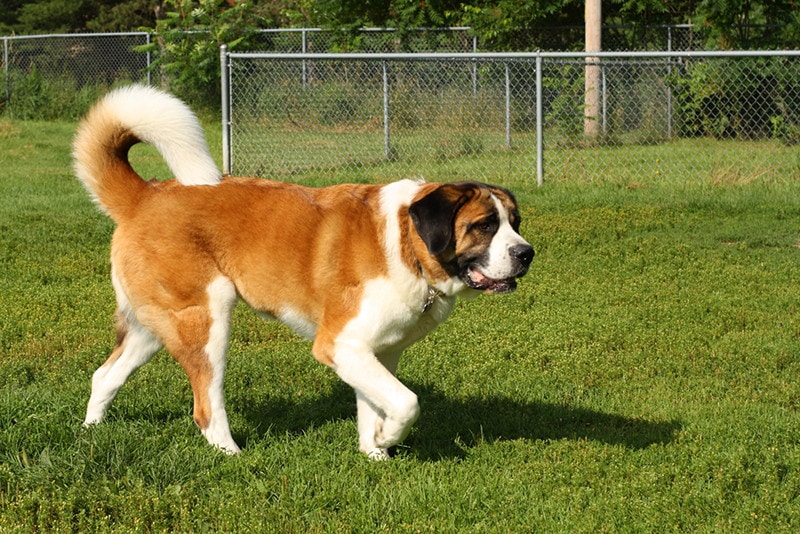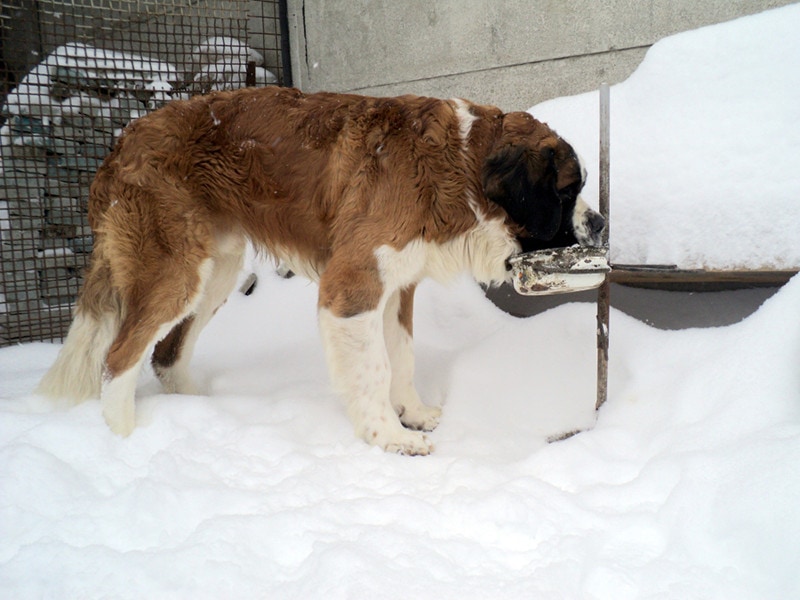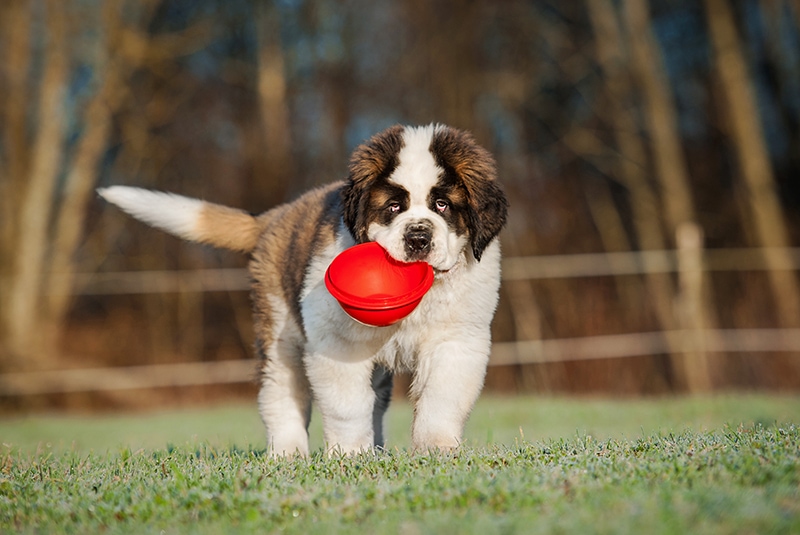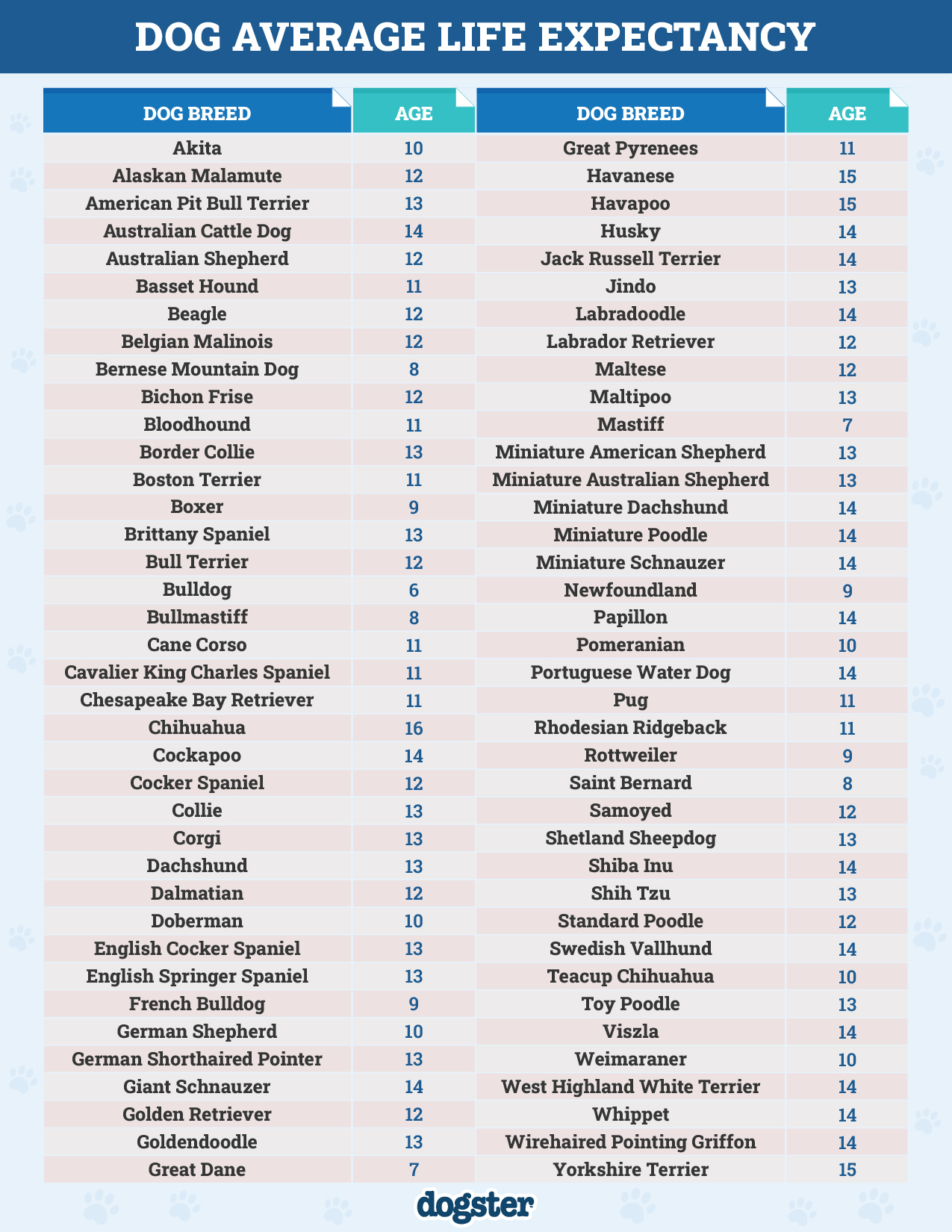Though St. Bernards have a reputation for hanging around the Swiss Alps, they actually make fabulous pets if you have the space! These gentle pups are wonderful with children and get along with almost any person or animal they meet. However, if you’re considering adopting one of these dogs, you need more information about it, such as how long the breed lives. Knowing the lifespan of a St. Bernard means you can more accurately determine the long-term cost of owning one.
Unfortunately, because the St. Bernard is a giant breed dog that can get as tall as 30 inches and weigh 180 pounds, it has a shorter lifespan than smaller breeds. St. Bernards only live for an average of 8–10 years. But there are things you can do to help ensure your St. Bernard lives their longest and happiest life.

St. Bernard’s Average Lifespan

The unfortunate truth of owning a St. Bernard is that they will normally only live to be between 8 and 10 years of age. This is fairly average for giant-sized dogs, as they tend to have a lifespan of about 2 years shorter than that of large breeds and 5 years shorter than medium breeds. However, the care you give to your St. Bernard can help them live the longest life possible.

How to Care for Your St. Bernard for a Long Lifespan?
There are things you can do to help your St. Bernard live a long and happy life. So what kind of care does this dog breed require? Luckily, we have the answer to that below!
1. Feeding & Diet
Research has shown that keeping your dog at optimal body condition throughout life can improve life span and keep your dog healthy. This means feeding your St Bernard a high-quality dog food specially formulated for giant breed dogs. Going with a giant-breed-specific dog food means your pet will get all the nutrients, vitamins, and minerals it needs, including those specific to health problems that can arise in giant breeds.
You’ll also want to choose a dog food that is age-specific, as puppies need different nutrients than adult dogs (particularly true for giant breeds, as they need specific elements to help their bones and bodies develop as they should).
It’s also important to note that these pups can be prone to obesity, which can shorten their lifespan, so speak with your dog’s veterinarian to ensure you’re feeding them only the amount of food they need.

2. Environment
A happy dog is healthier because it isn’t under stress or experiencing anxiety. So, you want to make your pet’s environment as St. Bernard-friendly as possible. These pups adore being part of the family and getting to do everything the humans are doing, so be sure to include them in family activities! Leaving them out could lead to your St. Bernard becoming depressed, which isn’t good for their health.
You’ll also need to consider if you have the space for a St. Bernard. These dogs are incredibly large, so they need plenty of room to maneuver, run, and play. This breed might not be best for you if you live in a smaller space, such as an apartment or somewhere that lacks a yard. The lack of space could have adverse effects on the dog’s health and well-being.
One other thing to pay attention to when it comes to the environment is the average temperature where you live. These dogs originally came from the Swiss Alps, so they have thick coats to keep them warm in cold weather. So, if you live in a location where it’s hotter more often than cold, a St. Bernard could have a difficult time as their coat could cause them to overheat.
3. Breeding History
Always adopt a dog via a reputable breeder, and always ask about a puppy’s lineage and health history. Reputable breeders will only use lines that have tested negative for common St. Bernard health concerns, while a disreputable breeder may try to sell a pup without any paperwork stating it is clear of potential health issues.
Also, find out how closely related your puppy’s parents are (if at all), as in-breeding of dogs can reduce their lifespans.

4. Healthcare
Like all dog breeds, St. Bernard is prone to a few particular health conditions, a couple of which are the results of its giant frame and tendency to want to overeat. These can shorten your pet’s lifespan, so keep a close eye on your dog’s health; this way, you can hopefully catch any issues early and better treat them.
- Bloat
- Hip dysplasia
- Osteosarcoma (bone cancer)
- Seizures
- Eye problems such as entropion

The Life Stages of a St. Bernard
Puppy: 0–2 years
Puppyhood is the most crucial time in your St. Bernard’s life, particularly when it comes to training and socializing them. Using positive, reward-based training from a young age is the best way to train your pup. Due to their size and weight, they need to learn good manners!
You can also ensure your dog’s health during this time by getting all required vaccinations and beginning your pet on flea and tick medication.

Adult: 2–8 years
Once your St. Bernard has reached the standard height and weight for its breed, your dog is officially an adult! This can take anywhere from 2–3 years from the time your St. Bernard is born. You can keep your pet healthy during this period by ensuring they receive proper balanced nutrition, plenty of exercise, and lots of mental stimulation. Also, be sure to get all your pup’s required vet visits in!
Senior: 8+ years
The senior years are the years you want to keep a close eye on your St. Bernard’s health, as some health issues will likely have cropped up by now. Be sure you’re taking your pet to the vet routinely to catch any health problems early or treat issues they already have.


How to Tell Your St. Bernard’s Age
One way to help determine your St. Bernard’s age is via its teeth. Puppies under 3/4 weeks old won’t have teeth, while those 1–2 months old will have tiny teeth that are quite sharp. If your dog is anywhere from 3 months to 1 year of age, it will have permanent teeth that are noticeably white.
If your dog’s teeth are stained or not in good condition they are likely older. If you still aren’t sure how old your St. Bernard is even after checking their teeth, have your vet take a look.


Conclusion
St. Bernards are, unfortunately, a shorter-lived breed with a normal lifespan of 8 to 10 years. This is fairly average for a dog of their size, though. But by taking proper care of your St. Bernard and ensuring it has quality food, proper health care, and is happy, you can help your pet live its longest, healthiest, and happiest life!
See also:
Featured Image Credit: rokopix, Shutterstock


















